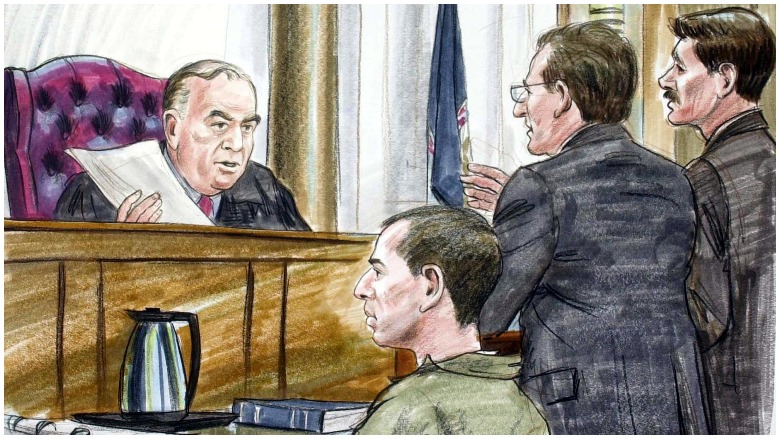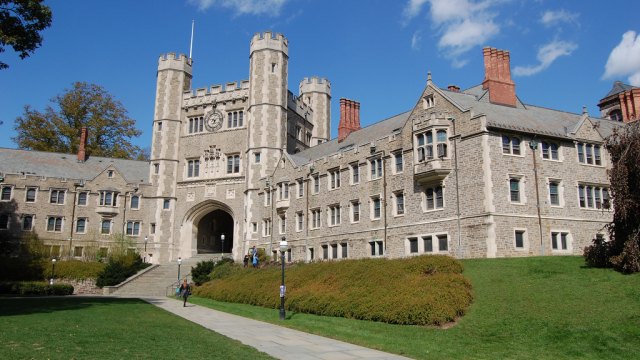
Getty T.S. Ellis
T.S. Ellis, the federal judge presiding over the trial of former Donald Trump campaign chairman Paul Manafort, is a Ronald Reagan appointee who once questioned the special prosecutor’s scope and whose colorful comments from the bench have drawn attention.
Ellis sentenced Manafort, 69, to 47 months in prison in the Eastern District of Virginia on March 7, 2019. Manafort faced up to 25 years in prison, and federal guidelines called for between 19 to 25 years. Ellis called those guidelines “excessive” and “high,” in giving Manafort a much shorter term.
The judge, who is based in Alexandria, Virginia, has handled high-profile cases before, sometimes coming down on the side of entities like the CIA and Blackwater. He’s a no-nonsense former Naval aviator, and his tongue lashings of prosecutors during the Manafort trial have caused some controversy. In one instance, he told the jury to disregard his own remark.
Ellis raised eyebrows on May 4, 2018 when he told special prosecutor Robert Mueller’s team during a court hearing: “You don’t really care about Mr. Manafort. You really care about what information Mr. Manafort can give you to lead you to Mr. Trump and an impeachment, or whatever.” Since then, he’s been on a roll, launching many other colorful quips and comments from the bench.
According to Fox News, Ellis also said the special prosecutor’s team’s argument amounted to: “We said this was what [the] investigation was about, but we are not bound by it and we were lying.” He added, “C’mon man!” Ellis alleges the prosecutors are trying to pressure Manafort to flip on Trump, saying, “the vernacular is, to sing.”
The judge has handled difficult cases involving national security. “Judge Ellis has presided over several high-profile national security cases, including United States v. Lindh (the so-called ‘American Taliban’ case); United States v. Franklin, Rosen, and Weissman, in which defendants were charged with engaging in a conspiracy to communicate National Defense Information to Israeli officials and AIPAC, in violation of the Espionage Act; and El-Masri v. Tenet, in which plaintiff Khalid El-Masri sued the CIA and three private security companies, alleging extraordinary rendition and torture,” a Princeton University biography on him reads.
Who is Judge T.S. Ellis III?
Here’s what you need to know:
1. Ellis Was Born in Bogota, Colombia & Wrote an Essay Arguing the Executive Branch Sometimes Over-Classifies Materials
Judge T.S. Ellis III was born in Bogota, Colombia, according to Ballotpedia. He is “a federal judge on senior status with the United States District Court for the Eastern District of Virginia,” the site reports.
According to the Federal Judicial Center, Ellis was born in 1940 and his full name is Thomas Selby Ellis III.
He wrote a 2013 essay describing the challenges inherent in national security cases. “National Security cases present challenging problems for federal courts—case management problems and problems raised by the novel and difficult legal issues these cases typically present,” Ellis wrote. “…On the basis of my exposure to classified information over a number of years…I have a firm suspicion that the executive branch over-classifies a great deal of material that does not warrant classification.”
Ellis also noted, though, that “Especially important here is the need to avoid disclosure of information that might reveal to an enemy analyst our country’s sources and methods of obtaining intelligence information.” The judge now finds himself in a similar quandary; he’s demanded an unredacted memo explaining the Mueller probe’s scope, but prosecutors are arguing portions of it are classified.
2. T.S. Ellis Was Nominated to the Federal Bench by Ronald Reagan

President Ronald Reagan
Ellis was placed on the bench by a Republican president: Ronald Reagan. He was confirmed on a voice vote.
“Nominated by Ronald Reagan on July 1, 1987, to a seat vacated by Robert R. Merhige. Confirmed by the Senate on August 5, 1987, and received commission on August 6, 1987. Assumed senior status on April 1, 2007,” his biography on the FJC page says. (Merhige had famously presided over Richmond, Virginia school desegregation cases, among others.)
“He is known for his sense of humor, his long digressions and his demanding and somewhat confrontational attitude toward the lawyers who appear before him,” The Washington Post reported of Ellis. That was before his comments during the Manafort trial sparked headlines.
3. Ellis Served in the Military & Attended Princeton

GettyPrinceton University
Judge Ellis has an Ivy League background and is a military veteran. He graduated from Princeton University in 1961 (his bachelor’s degree was in engineering) and received a Harvard law degree in 1969. He has a diploma of law from the University of Oxford Faculty of Law that dates to 1970, his bio reads.
He served in the U.S. Navy from 1961-1966. According to Princeton University, Ellis “served as an aviator in the U.S. Navy from 1961-67, attaining the rank of Lieutenant.”
Before his nomination to the bench, Ellis was a lawyer who worked in private practice. He has taught courses at the College of William and Mary, although that work dates back to the early 1980s. He worked in private practice in Richmond, Virginia for the firm Hunton & Williams LLP. “…he was a litigation partner in private practice with the Virginia-based international law firm of Hunton and Williams from 1969-87,” Princeton reports.
According to Bloomberg, he has been a board member of numerous legal associations, including the Virginia Poverty Law Center and Science Museum of Virginia.
4. He Sided With Blackwater in a Case & Allowed a Democratic Congressman to Stay Free Pending Appeal
The judge’s colorful commentary has sparked both praise and criticism and, as you can see above, has even led to memes. With his long history on the bench, though, Ellis has had a chance to handle other controversial cases.
In one of the highest-profile cases Ellis handled as judge, he sided with the Blackwater security firm in lawsuits filed by Iraqi victims. “A federal judge on Wednesday tossed out a series of lawsuits filed by alleged Iraqi victims of the contractor once known as Blackwater USA, but is allowing the plaintiffs to refile their claims,” The Associated Press reported at the time.
Although Ellis allowed the Iraqis to refile their cases, he made it tougher for them to prevail. “Ellis is allowing most of the plaintiffs to refile, but only if they will be able to prove that employees engaged in intentional killings and beatings,” a higher standard than recklessness or “a culture of lawlessness,” AP reported. That decision came down in 2009.
In 2006, BBC reported, Ellis “dismissed a lawsuit brought by a German citizen who says he was kidnapped and beaten by the CIA.”
“In times of war, our country, chiefly through the executive branch, must often take exceptional steps to thwart the enemy,” the judge stated in his decision.
That same year, according to The New Orleans Times-Picayune, Ellis allowed former Democratic Congressman William Jefferson to “remain free pending his appeal of his guilty verdict on 11 corruption counts.” He meted out a sentence of 13 years in prison, though.
Ellis also ruled against Wikimedia in “an anti-surveillance lawsuit… ruling in favor of the National Security Agency,” according to Arstechnica.com. Essentially he ruled that Wikimedia and others “could not prove that they had been surveilled,” the site reports.
5. Ellis Sentenced the ‘American Taliban’ Defendant to Prison & Told the Jury to Ignore His Chastising of Prosecutors in the Manafort Trial
In the case of Paul Manafort, who faces bank and tax fraud allegations not involving Trump’s presidential campaign (and an investigation prosecutors revealed predated the Mueller probe), the judge demanded to see the memorandum documenting Mueller’s scope.
“We don’t want anyone in this country with unfettered power. It’s unlikely you’re going to persuade me the special prosecutor has power to do anything he or she wants,” Ellis said in court on the Manafort case. “The American people feel pretty strongly that no one has unfettered power.” Manafort also still faces charges – the bulk of them – in a different Washington D.C. court.
However, Trump seized on the judge’s comments at an NRA rally on May 4, 2018, saying, “Judge T.S. Ellis who is really something very special I hear from many standpoints. He is a respected person.”
Michael Dreeben, the deputy solicitor general arguing for Mueller’s team, stated that the team’s scope “did cover the activity in the indictment” against Manafort, USA Today reported, to which Ellis retorted, “Cover bank fraud in 2005 and 2007? Tell me how!”
During the trial itself, in August 2018, Ellis has made numerous colorful quips. Among them: He told a prosecutor, “I understand how frustrated you are. In fact, there’s tears in your eyes right now.”
He chastised a prosecutor for seemingly not looking at him, saying, “Look at me! Don’t look down.”
However, the judge told the jury that he was “probably wrong” when he berated prosecutors during the trial, The Washington Post reported. The judge had criticized the prosecution team for “allowing an expert government witness to sit in the courtroom before he testified,” according to The Post. He told the jury to disregard his comment.
According to Fox News, Ellis was the sentencing judge in the case against the so-called “American Taliban,” John Walker Lindh. He sentenced Lindh, then 21, to 20 years in prison “after he pleaded guilty to charges related to his activity with the Taliban in Afghanistan,” Fox reports.


